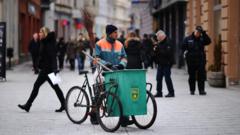Health officials in Sarajevo are grappling with a surge in rat-borne diseases linked to an increase in the rodent population, prompting emergency actions from local authorities in response to community health concerns.
Sarajevo Faces Health Crisis as Rat Population Surges

Sarajevo Faces Health Crisis as Rat Population Surges
The rise of rat-borne diseases in Sarajevo has led local authorities to declare a state of emergency, prompting urgent cleanliness measures.
In Sarajevo, a troubling resurgence of rat-borne diseases has put the city's health system on high alert. The streets and waterways of Bosnia and Herzegovina's capital have become a breeding ground for rodents, exacerbated by overflowing rubbish bins and neglected public spaces. Social media posts from concerned citizens reflect the dire situation, as they share images of rats swimming in the Miljacka River and overflowing trash, coupled with complaints about the government's inaction on clearing the city of dead animals.
Experts highlight a drastic increase in the incidence of leptospirosis, often referred to as rat fever, due to the unchecked rodent population. Over a single day, the capital's largest hospital reported a dozen new cases, following a similar wave of infections throughout the month. The disease is primarily spread to people via contaminated water or soil, with symptoms ranging from headaches to severe complications like jaundice and kidney failure if untreated.
In response to the growing health threat, local authorities declared an epidemic, resulting in emergency measures aimed at cleaning the city. This includes deploying additional municipal workers for extensive sanitation efforts and directing schools to enhance hygiene in playgrounds and other areas. This proactive response starkly contrasts previous two years where there was a lack of pest control initiatives due to a failed tender process for extermination services.
Sarajevo Canton Health Minister Enis Hasanovic referred to the unfolding scenario as a "communal crisis," attributing the current health risks to the local government's failure to uphold basic sanitation standards. Compounding concerns, former clinical center director and current assembly member Sebija Izetbegović warned that the rampant rat population could also lead to the spread of potentially dangerous hantavirus.
Despite these serious risks, health officials remain cautious. While leptospirosis can be fatal without treatment, no severe cases have been reported in the current outbreak so far. Emergency protocols have been activated, but the long-term solution to controlling Sarajevo's rat crisis remains to be seen.





















